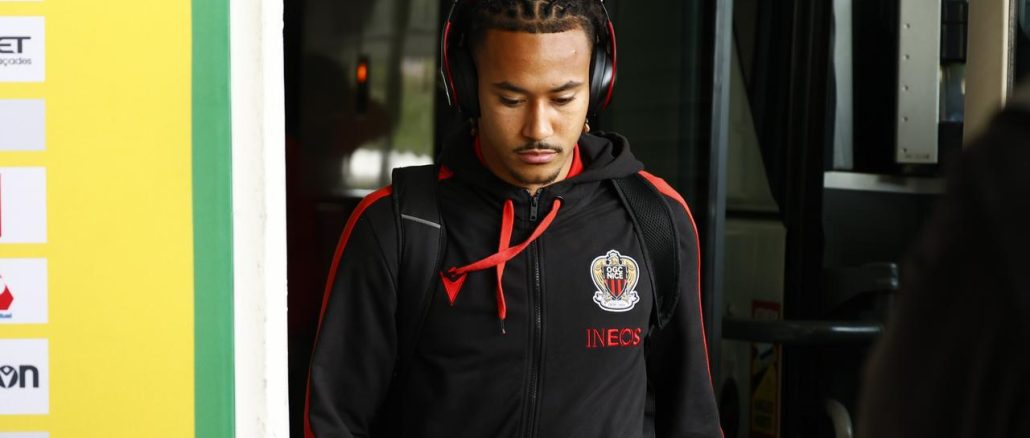
French football player Alexis Beka Beka stands on a bridge, threatening suicide
The French football world was left in shock on Friday when news broke that OGC Nice player Alexis Beka Beka had climbed onto a bridge and threatened to jump, potentially taking his own life. The incident occurred on the Mangan Bridge, which stands approximately 100 meters high on the A8 motorway near Nice. Local authorities, including the police and fire brigade, immediately responded to the distress call and a psychologist was dispatched to the scene to speak with the troubled player.
Possible Relationship Breakdown
While the exact reasons for Beka Beka’s actions have not been confirmed, reports suggest that a relationship breakdown might have been a contributing factor. However, this information is still speculative and has not been officially verified.
In response to the incident, OGC Nice made the decision to cancel their scheduled press conference, which was meant to provide updates on the team and upcoming matches. Journalists who were already present at the press conference were asked to leave the premises. Despite the unsettling situation, training sessions for the team proceeded as planned.
A Rising Talent Struggling On and Off the Field
Alexis Beka Beka, a 22-year-old midfielder, began his professional football career with SM Caen three years ago, before moving on to Lokomotiv Moscow a year later. In the summer of 2020, Beka Beka signed with OGC Nice, where he has since played in 22 games.
Unfortunately for Beka Beka, he has not yet seen any playtime this season, despite being included in the match selection twice. Prior to this incident, he had also represented France in the 2021 Olympic Games as a former youth international.
The young player’s struggle both on and off the field highlights the challenges that professional athletes face in managing their mental health and personal lives alongside the demands of their careers. It serves as a stark reminder that behind the glamour of sports, athletes are human beings dealing with their own personal battles.
Safeguarding Player’s Mental Health
The Importance of Mental Health Support in Sports
The incident involving Alexis Beka Beka reinforces the urgent need for comprehensive mental health support for athletes. Sporting organizations and clubs have a responsibility to prioritize the well-being of their players and provide them with the resources they need for their mental and emotional health.
Professional athletes often face immense pressure, both on and off the field. The demanding nature of their careers, intense competition, and the public scrutiny they constantly endure can take a toll on their mental well-being. It is crucial for clubs and governing bodies to implement policies and support systems that address these unique challenges.
Breaking the Stigma
One of the significant hurdles in addressing mental health in sports is the persistent stigma surrounding mental illness. Athletes may feel ashamed or fear backlash for seeking help, as mental health issues are often associated with weakness or a lack of resilience.
Efforts must be made to break down these barriers and create an environment where athletes feel comfortable speaking openly about their mental health. This includes educating coaches, teammates, and staff on recognizing warning signs, providing confidential resources, and creating a culture of support and understanding.
Sporting organizations can also play a vital role in raising awareness around mental health by promoting campaigns and initiatives that encourage open dialogue. By sharing stories of athletes who have overcome mental health challenges, the sports community can send a powerful message of support and encourage others to seek help when needed.
Long-Term Well-being
While immediate intervention is crucial in cases like Alexis Beka Beka’s, it is equally important to ensure long-term support for athletes’ mental well-being. Clubs and governing bodies should collaborate with mental health professionals to develop comprehensive programs that address the various aspects of mental health.
This includes regular counseling services, access to psychologists or therapists specializing in sports psychology, and educational workshops on stress management and resilience. By incorporating mental health care into standard athlete welfare programs, organizations can create a safety net for players and foster a culture of proactive mental well-being.
Moving Forward and Seeking Help
A Lesson for the Sports Community
The incident involving Alexis Beka Beka serves as a wake-up call for the sports community to prioritize mental health support for athletes. It highlights the need for clubs, teams, and governing bodies to proactively address mental health concerns and provide the necessary resources to support their players.
A united and collaborative effort is required to break the stigma surrounding mental illness in sports. By fostering an environment that encourages open dialogue, seeks early intervention, and offers ongoing support, the sports community can play a significant role in the overall well-being of its athletes.
It is crucial for individuals who are struggling with their mental health, like Alexis Beka Beka, to reach out for help. Support is available through numerous helplines, crisis centers, and mental health organizations. Remember, seeking help is a sign of strength, not weakness.
Let us come together and create a sports community that prioritizes the physical, emotional, and mental well-being of its athletes, ensuring that incidents like this never occur again.

Be the first to comment